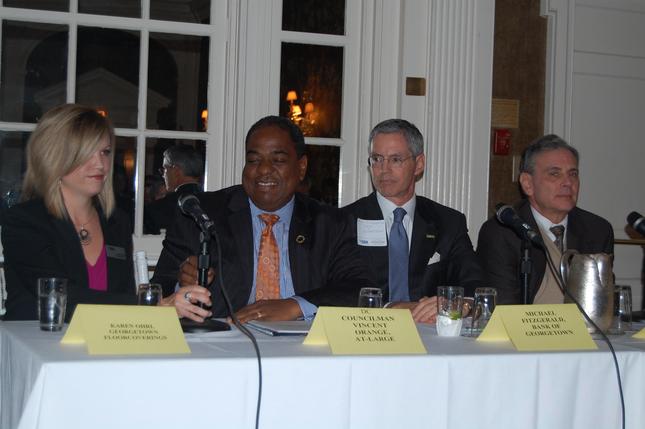The Final Bell? Zoning Hearing on G.U. Campus Plan, Nov. 17
The punch counter-punch continues between the university and the town, as groups prepare for the final zoning meeting Nov. 17 on Georgetown University’s 2010-2020 Campus Plan.
Agreeing with Georgetown and Burleith residents’ group, Georgetown’s advisory neighborhood commission last week fired a final volley against Georgetown University’s future development plans with its ANC 2E Supplemental Submission for the D.C. Zoning Commission (Z.C. Case No. 10-32), “G.U.’s Campus Plan, as Amended, Still Does Not Adequately Address the Objectionable Conditions in the Neighboring Community.”
The ANC began: “ANC 2E agrees with the comments submitted by the Citizens Association of Georgetown (CAG) and the Burleith Citizens Association (BCA) in response to G.U.’s rebuttal materials and new initiatives. The overwhelming objectionable impact of the university’s proposed plan on the neighboring community is that it would keep in place a very large number of off-campus transient student group houses and all the problems they bring. G.U.’s grudging, small-scale responses to community concerns throughout this case have been disappointing. . . . GU has come back with no commitment to additional on-campus or satellite housing beyond the token number of beds conditionally offered in its March 31 filing. Instead, G.U. offers essentially more of the same policies and practices that have failed for the past 20 years.”
The ANC also outlined the following in its 46-page submission: “G.U.’s Campus Plan, as amended, still does not adequately address the objectionable conditions in the neighboring community; G.U.’s rules for on-campus vs. off-campus partying encourage off-campus partying; G.U.’s campus density (students per acre) compares very unfavorably with its peer universities; the Zoning Commission is authorized to require the university to obtain prior approval before acquiring further real estate in zip code 20007; unremedied existing objectionable conditions are legitimate grounds for ordering relief in a campus plan case; providing university housing on campus or in a satellite location for G.U.’s undergraduates is the only remedy that will adequately mitigate G.U.’s objectionable impacts on the community . . .”
Citing an Oct. 23 editorial in the Washington Post that appeared to favor Georgetown’s efforts and most of its campus plan, the university’s president, John J. DeGioia, sent out an email letter to supporters:
“Georgetown’s campus plan offers modest, targeted growth opportunities that will meet our strategic needs for the next decade . . . Last week, the Washington Post editorial page wrote about our plan, recognizing the important economic contribution that Georgetown and other higher education institutions make to our city. As the largest private employer in Washington, Georgetown paid approximately $175 million in wages and salaries to D.C. employees last year and spent $86 million on the purchase of goods and services in the District. We are proud that 40 percent of our 9,800 employees are D.C. residents. . . .
“We’ve heard the concerns of our neighbors, and we have responded by investing in a number of successful initiatives. In August, we started a new M Street Shuttle, moving more than 9,300 students so far between campus and M Street on weekend nights. We have collected more than 120 tons of trash from neighborhood streets on new, twice-daily trash patrols. And we have increased our partnership with D.C. police, funding seven officers in the neighborhood on Thursday, Friday and Saturday nights to help keep our neighborhoods safe. The 2010-2020 campus plan and our investments in our surrounding neighborhoods will allow us to continue to attract and educate the very best students.”
The university is touting its website for the neighborhood: neighborhood.georgetown.edu. The site also debuted “Rocky’s Report,” a weekly public safety message from the Office of Public Safety for the Georgetown neighborhood. University spokesperson Stacy Kerr said it is posted by Georgetown Chief of Police Rocco Del Monaco to connect with residents. “Rocky will separate fact from fiction, set the record straight and give a report directly from the folks who are in the neighborhoods responding to concerns and proactively working to keep us safe,” she said.
The Zoning Commission hearing is scheduled for Thursday, Nov. 17, 6:30 p.m., One Judiciary Square, 441 4th Street N.W.
Forum: Find Ways to Let Small Businesses Flourish
A wide-ranging forum at the City Tavern Club Nov. 9, put on by the Georgetown Business Association and the Georgetown Business Improvement District, was led by GBA’s Janine Schoonover who introduced the panelists and asked submitted questions of each: Karen Ohri, Georgetown Floorcoverings; At-large Councilman Vincent Orange; Michael Fitzgerald, Bank of Georgetown; lawyer Joel Bennett; Ward 2 Councilman Jack Evans; Charles McGrath, MRP Realty, Washington Harbour; 2E Advisory Neighborhood Commissioner Bill Starrels; and John Hays, owner of The Phoenix.
Among the highlights: advocating for small businesses and making government regulations and programs more responsive to small businesses. Orange stressed D.C.’s business development efforts, including the Streetscape Survival Fund. Ohri recalled how becoming a D.C. Certified Business Enterprise had saved her company, allowing it to compete against bigger businesses. Evans said that $120 million has been put into Georgetown over the past 10 years and reminded the audience of the exploding manhole covers in 2000. Everyone agreed how much progress has been made and how Georgetown is in fine shape. It was the issue of maintaining what works and making it better. McGrath echoed such sentiments as his company wants to take the Washington Harbour complex to a Class A level, he said. Hays, who said living and working in Georgetown “make it a wonderful place,” later suggested that Wisconsin Avenue be closed on Sunday once a month to be used as a pedestrian mall. (Hmm, nice idea, but sounds impractical what with bus routes and all.)
Other ideas touched on: better mentoring, planning and capitalization for businesses — along with studying other successful commercial corridors. At the end of the panel discussion, a few in the audience stood up to their opinions of business matters: Sharon Hays of the Phoenix touted the shops up Wisconsin Avenue, not just those on M Street; Sara Mohktari of Tari brought up the tension between preservation and development and obstacles for her businesses, adding that she “would not invest in Georgetown again.” One last Georgetown Park tenant, Rush Hour Printing, lamented the end of the shop’s lease and asked aloud how it might survive in Georgetown – underlining to all how the unneighborly and non-communicative Vornado Realty Trust, owner of Georgetown Park, would not understand such an open business forum, discussing issues only doors from its entrance on M Street.
D.C. to Receive $6M for Georgetown Library Fire
Stunned lunchtime on-lookers at Wisconsin Avenue and R Street who witnessed the April 30, 2007, fire of the Georgetown Public Library have been grateful for the library’s rebirth. They can now be pleased that the District will receive $6 million from that day’s construction contractor after a lawsuit settlement; nearly $18 million has been spent by the city to rebuild the library. A worker’s “mechanical heat device” accidentally started the blaze which began in the top floor, according to investigators, causing its cupola and roof to collapse.
The library’s unique historical items of Georgetown – the Peabody Collection – were saved by water from the fire hoses but needed to be frozen quickly to prevent mold and begin the restoration process. The Peabody Room has been restored but needs $125,000 to finish the job.
To help out, visit this Saturday’s Georgetown Library Book Sale, Nov. 19, 10 a.m. to 3 p.m. – art and children’s books, DVDs as well as autographed and rare books. The Friends of the Georgetown Library are running the sales tables.
Evans Challenger Drops Out
“I made some mistakes in trying to wage a campaign, but I don’t consider it a mistake that I tried. After six weeks of intense effort, I decided I just wasn’t ready to mount the kind of campaign it would take to win,” said Fiona Greig, a Democratic candidate for the Ward 2 council seat long held by Jack Evans, as she dropped out of the race last week and also claimed intimidation from her opponents. The D.C. primary will be held April 3, 2012.
To read Greig’s official statement, go to Fiona2012.org/Statement
- Forum




